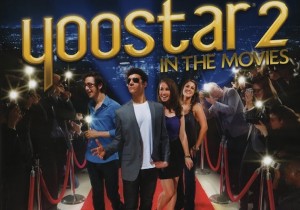
By
Rob ScottApril 15, 2011
The movie karaoke game, Yoostar 2 is designed to put players in scenes from their favorite movies and TV shows, enabling them to “perform” with professional actors. Users can then post the resulting video clips on the Yoostar web site, or social networking sites such as Facebook and Myspace. Yoostar 2 for the Xbox 360 Kinect and PlayStation Move was released last month.
 The connectivity between gaming and social networking could mark the first step toward an experiment that might soften the tension amongst developers in the two arenas.
The connectivity between gaming and social networking could mark the first step toward an experiment that might soften the tension amongst developers in the two arenas.
Scott Steinberg writes in a Mashable post: “You can seamlessly upload video performances online via PlayStation Network or Xbox Live right to social networks, where others can vote, bestow Internet fame and follow your antics. Using the service, it’s not only possible to share viral videos of you doing your best impression of Marlon Brando in ‘The Godfather’ via Facebook and Twitter. You can also earn rewards that unlock content in the disc-based console versions of the game.”
In an era where major game publishers tend to categorize social games into standalone experiences, Yoostar 2 may represent “one of the first efforts to bridge the gap between devices and platforms.”
Steinberg provides an interesting six-minute video report from the Yoostar offices in Santa Monica, California that includes interviews, demos and footage from the game, and of particular interest, the technology used to eliminate the need for green screen.
By
Rob ScottApril 5, 2011
Internet law columnist Michael Geist, writing for the Toronto Star, comments on a new global study on piracy backed by Canada’s International Development Research Centre that suggests “piracy is chiefly a product of a market failure, not a legal one.”
The media piracy study — in an effort to analyze infringements regarding music, movies, and software — was launched five years ago by the Social Science Research Council. Institutions in South Africa, Russia, Brazil, Mexico, Bolivia, and India were identified to better understand the international media market and related piracy issues. The resulting 440-page report is the most thorough analysis of media piracy to date.
The report sets the record straight on several popular piracy myths. For example, it states there are no links between piracy and organized crime, there is no evidence indicating that anti-piracy education programs have any impact on consumer behavior, and tougher legal penalties do not necessarily provide a deterrent to piracy.
The report also suggests that piracy is primarily a result of market failure, not legal failure. Geist writes: “In many developing countries, there are few meaningful legal distribution channels for media products. The report notes ‘the pirate market cannot be said to compete with legal sales or generate losses for industry. At the low end of the socioeconomic ladder where such distribution gaps are common, piracy often simply is the market.’”




